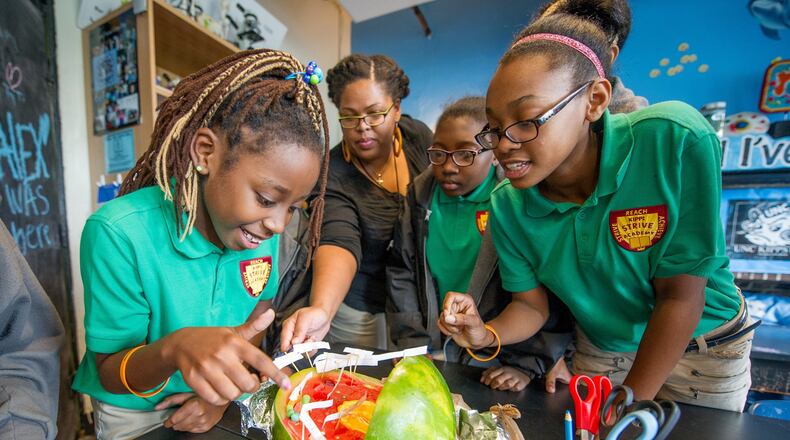In a guest column, two leaders of the KIPP Metro Atlanta Schools discuss qualities to look for in candidates running for the Atlanta school board. Mini’imah Shaheed is chief executive officer and Lawrence Harris is chief impact officer of KIPP Metro Atlanta Schools.
Ten candidates are running for five of the nine seats on the Atlanta school board. All nine seats used to be on the ballot at once, but a 2020 law changed that. Candidates in odd-numbered districts in the 2021 race ran for two-year terms, which are coming to an end. Seats in even-numbered districts will be up for reelection in 2025.
You can see who is running here and read about their views here.
By Mini’imah Shaheed and Lawrence Harris
As we cast early ballots and approach the Nov. 7 election, we might recall the hopeful promises of our Atlanta Board of Education candidates. They echo, in spirit if not poetry, our beloved Atlantan’s declaration against despair: “We must accept finite disappointment,” the Rev. Martin Luther King Jr. said, “but never lose infinite hope.”
The winning candidates must balance impatient pledges with patient policy. Georgia’s test results underscore the long recovery ahead. COVID-19′s aftermath includes a doubling of chronic absenteeism across Atlanta schools and unprecedented student loneliness, anxiety and depression. The academic, social and emotional effects were worse among students of color in historically disadvantaged communities.
This is clear to us as leaders of Atlanta’s 11 KIPP schools, where we educate about 10% of the district’s children, primarily in communities disproportionately affected by the pandemic. It also should be clear to anyone who makes decisions about the city’s schools at large. Student achievement across Atlanta schools, including KIPP’s, does not reflect the heroic efforts of our students, teachers and families.
Credit: Contributed
Credit: Contributed
If we look beyond raw test results, we also see resilience. Our students have learned how to adapt, solve problems and learn in conditions that put extraordinary demands on them. The pandemic also imposed enormous new responsibilities on our teachers. They made extra space for our students to express their fears, innovated as they unexpectedly adapted in-person curriculum for virtual instruction and connected even more closely with families and community partners.
Credit: Contributed
Credit: Contributed
In an ongoing effort to create innovative ways to engage families, schools have embraced various out-of-the-box strategies. They provided supplementary instructional materials for families to use at home, as well as breakfast and lunch that families could pick up for their children.
Whether it is through digital platforms, such as parent portals and online newsletters, or through traditional means like parent-teacher conferences and in-person meetings, schools are actively establishing channels for effective communication. By keeping families informed, involved and invested, dedicated teachers help bridge the gap between home and school, fostering a supportive network that benefits students greatly.
Moreover, in our fast-paced world, where time seems to slip through our fingers, it is also heartening to witness the unyielding determination of families who go above and beyond to actively engage in their children’s education. Balancing work demands with the needs of a family can be quite the juggling act.
Yet, countless parents find the resilience and time to attend parent-teacher meetings, aid with homework, and involve themselves in school activities. Their dedication is commendable as it underscores the critical truth that education is not solely the responsibility of the school but a team effort.
The collaborative efforts between families and dedicated school staff empower students, enabling them to progress and ultimately flourish academically, emotionally and socially. These efforts are the real and quiet labor of students, families and teachers across our city. Atlanta is full of stories that show us the resilience and potential of our public schools. More than any test score, the many acts of our neighbors tell the tale.
There are morals to that story, the latest chapter of our collective educational narrative. Among them: Progress is a multifaceted journey. Success transcends one data set at a single moment in time. Each child learns at a unique pace. We must support children academically, socially and emotionally. We must ensure they have nutritious food, clean clothes and reliable shelter.
We should remember these lessons as we assess candidates’ promises and cast our votes. Improving our schools requires a long-term strategy that focuses on the whole child, not short-term tactics that pit academics as a false choice against all else. It demands a delicate balance: patience that reflects commitment, not complacency, and impatience for progress, not just for power.
Among candidates, consider: Who emphasizes social-emotional learning and increased support for mental health? Who embraces flexible learning models and targeted interventions for struggling students? Who advocates for community partnerships that help families meet basic needs, so their children can focus on learning? Who wants to extend learning beyond the school day and year?
These questions guide the work we do as educators as we collaborate with and learn from others. They reflect humility to admit that we cannot do this work alone and urgency to find solutions wherever they exist. They can also guide our choices in this election.
As the rhetoric of campaigning meets the reality of governing, victors should heed King’s words and keep hope. They also should observe another expression of his optimism: “With patient and firm determination we will press on until every valley of despair is exalted to new peaks of hope.”
We are all braving the valley, impatient to reach new peaks. But the long climb ahead demands patient progress.
About the Author
The Latest
Featured




